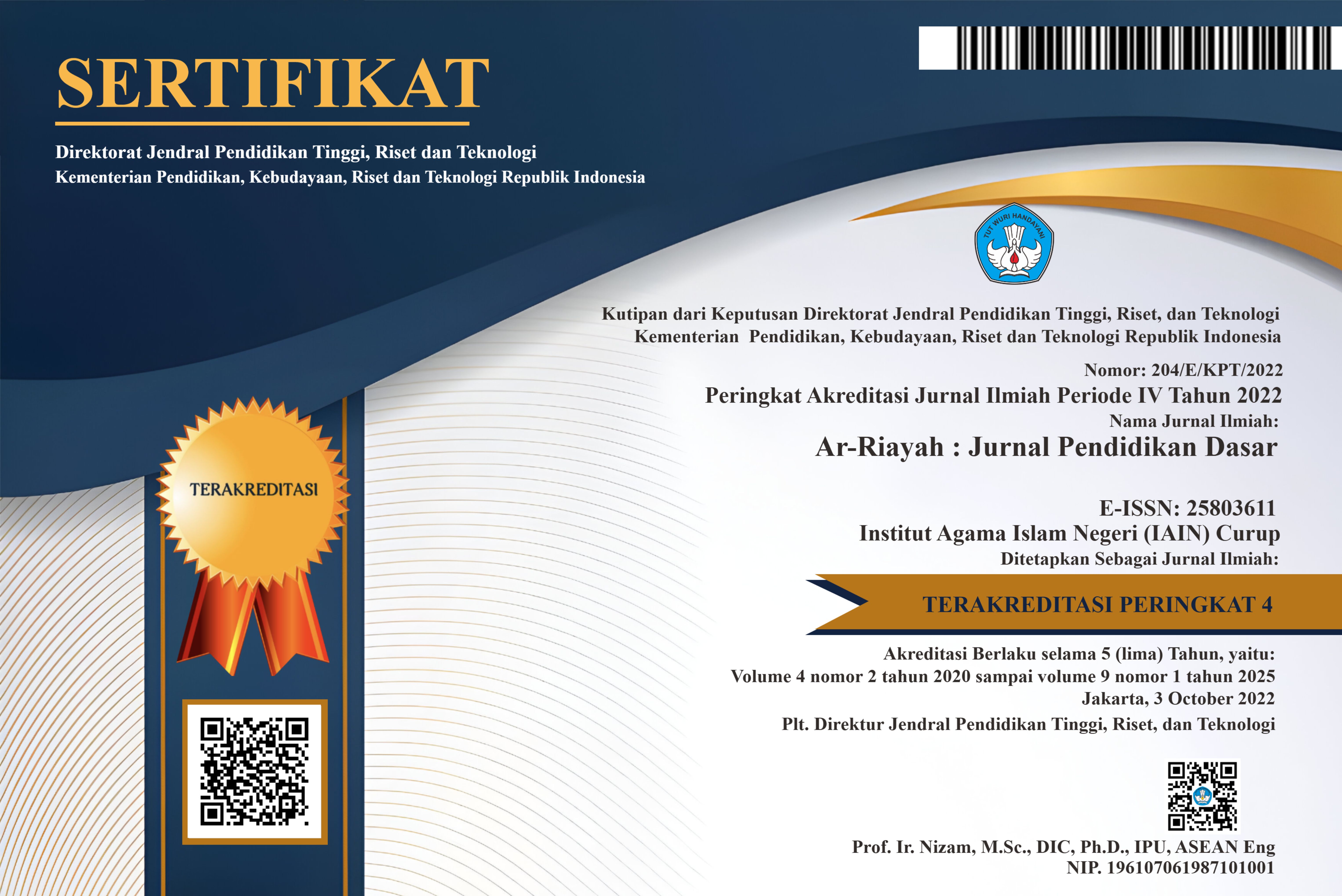Implementasi Pendidikan Karakter Religius untuk Menumbuhkan Literasi Moral Siswa SD melalui Program Kampus Mengajar
DOI:
https://doi.org/10.29240/jpd.v8i2.11160Keywords:
Character Education, Student, Morale DevelopmentAbstract
This research focuses on the character education process through the 7th batch of teaching campus programs conducted at SD Negeri 3 Nasol. The focus of this study is the process of implementing character education through the teaching campus program in elementary schools. Character education is carried out through habituation, integration, and imitation processes. This research is a descriptive qualitative research. Data was collected through interviews, observations, and documentation. The data analysis technique used is through the stages of data collection, data reduction, data presentation, and conclusion drawn. The results of this study show that there is a character education process carried out during the 7th batch of teaching campus assignments. Of course, the success of character education is inseparable from the role of assistance from the school which always helps in the implementation of the 7th batch of teaching campus work programs. The character education program in the habituation aspect that is carried out is the duha prayer together, reading asmaul husna before learning, and praying before and after learning. Meanwhile, the character education program in the integration aspect is carried out through fun learning activities, mini cinemas, and Ramadan Islamic boarding schools. The character education program activities in the imitation aspect are carried out through 5S habituation. These various activities succeeded in making students know about virtue values. Students are seen to be increasingly obedient to worship, disciplined, responsible, independent, and creative.
Downloads
References
Amilda. (2023). Patterns of Character Education for Vocational School Students through Non-Academic Programs: Paradigm and Implementation. International Journal of Learning, Teaching and Educational Research, 22(4), 459-477.
Asnawan, A. (2020). Exploring Education Character Thought of Ki Hajar Dewantara and Thomas Lickona. International Journal on Advanced Science, Education, and Religion, 3(4), 164-174.
Bates, A. (2019). Character education and the ‘priority of recognition’. Cambridge Journal of Education, 49(6), 695-710.
Berkowitz, M. W. (2011). What works in values education. International journal of educational research, 50(3), 153-158.
Chairunnisa, C. (2022). Character Education and Teacher’s Attitudes in Preventing Radicalization in Junior High School Students in Indonesia. Eurasian Journal of Educational Research, 2022(97), 252-269.
Effendi, Y. (2023). Strategy for the Principal's Transformational Leadership Approach in Strengthening the Character of Indonesian Students. Pedagogika, 151(3), 5-33.
Hidayat, M., Rozak, R. W., Hakam, K. A., Kembara, M. D., & Parhan, M. (2022). Character education in Indonesia: How is it internalized and implemented in virtual learning. Cakrawala Pendidikan, 41(1), 186-198.
Islamic, G. (2024). Character education through philosophical values in traditional Islamic boarding schools. Kasetsart Journal of Social Sciences, 45(1), 31-42.
Istiyono, E., Kartowagiran, B., Retnawati, H., Cahyo Adi Kistoro, H., & Putranta, H. (2021). Effective Teachers' Personality in Strengthening Character Education. International Journal of Evaluation and Research in Education, 10(2), 512-521.
Koutelidas, A., Digelidis, N., Syrmpas, I., Wright, P., & Goudas, M. (2022). Students’ perceptions of responsibility in physical education: a qualitative study. Education 3-13, 50(2), 171-183.
Kristjánsson, K. (2020). An introduction to the special issue on wisdom and moral education. Journal of Moral Education, 49(1), 1-8.
Lovat, T., & Clement, N. (2008). Quality teaching and values education: Coalescing for effective learning. Journal of moral education, 37(1), 1-16.
Maisyaroh, M. (2023). Strengthening character education planning based on Pancasila value in the international class program. International Journal of Evaluation and Research in Education, 12(1), 149-156.
Nasrudin, E., & Fakhruddin, A. (2023). PENGUATAN PENDIDIKAN KARAKTER RELIGIUS MAHASISWA MELALUI PROGRAM TUTORIAL KEAGAMAAN. Waskita: Jurnal Pendidikan Nilai dan Pembangunan Karakter, 7(2), 143-158.
Nasrudin, E., Sandi, M. K., Alfian, M. I., & Fakhruddin, A. (2023). Penguatan pendidikan karakter religius melalui ekstrakurikuler keagamaan di SMA Negeri 3 Bandung. Jurnal Pendidikan Karakter, 14(1).
Njelezi, M. (2023). Education in values: An analysis of teachers’ role in Mozambican military higher education. Heliyon, 9(6).
Nuranifah. (2022). MANAGEMENT OF STRENGTHENING ISLAMIC CHARACTER EDUCATION IN SENIOR HIGH SCHOOL. Jurnal Ilmiah Peuradeun, 10(3), 629-640.
Nurdin, E. S. (2015). The Policies on Civic Education in Developing National Character in Indonesia. International Education Studies, 8(8), 199-209.
Nurdin, E. S. (2015). The Policies on Civic Education in Developing National Character in Indonesia. International Education Studies, 8(8), 199-209.
Osguthorpe, R. D. (2009). On the possible forms a relationship might take between the moral character of a teacher and the moral development of a student. Teachers College Record, 111(1), 1-26.
Phelps, A. (2023). Exemplars Embodied: Can Acting Form Moral Character? Educational Theory, 73(5), 728-748.
Pike, M. A., Hart, P., Paul, S. A., Lickona, T., & Clarke, P. (. (2021). Character development through the curriculum: teaching and assessing the understanding and practice of virtue. Journal of Curriculum Studies, 53(4), 449-466.
Pike, M. A., Hart, P., Paul, S. A., Lickona, T., & Clarke, P. (2021). Character development through the curriculum: teaching and assessing the understanding and practice of virtue. Journal of Curriculum Studies, 53(4), 449-466.
Puspitarini, D. (2023). Humanistic Pesantren: Systematic Literature Review and Bibliometric Visualization Analysis on Character, Moral, and Ethical Values. Pertanika Journal of Social Sciences and Humanities, 31(2).
Sartika, R. (2024). Strengthening Students' Responsible Character through Civic Education Learning: An Action Research in Indonesia. International Journal of Learning, Teaching and Educational Research, 23(3), 428-447.
Schuitema, J., Dam, G. T., & Veugelers, W. (2008). Teaching strategies for moral education: A review. Journal of curriculum studies, 40(1), 69-89.
Shabrina, L. M. (2022). Kegiatan kampus mengajar dalam meningkatkan keterampilan literasi dan numerasi siswa sekolah dasar. Jurnal Basicedu, 6(1), 916-924.
Sutton, J., & Austin, Z. (2015). Qualitative research: Data collection, analysis, and management. The Canadian journal of hospital pharmacy, 68(3), 226.
Suyadi. (2022). COVID-19 ambassadors: Recognizing Kampus Mengajar at the Merdeka Belajar Kampus Merdeka program humanitarian projects in the tertiary education curriculum. Frontiers in Education, 7.
Suyatno, S. (2023). Developing Pre-Service Teachers’ Professionalism by Sharing and Receiving Experiences in the Kampus Mengajar Program. Education Sciences, 13(2).
Tohri, A., Rasyad, A., Sururuddin, M., & Istiqlal, L. M. (2022). The Urgency of Sasak Local Wisdom-Based Character Education for Elementary School in East Lombok, Indonesia. International Journal of Evaluation and Research in Education, 11(1), 333-344.
Downloads
Published
How to Cite
Issue
Section
Citation Check
License
Copyright (c) 2024 Ega Nasrudin, Aceng Kosasih, Agus Fakhruddin

This work is licensed under a Creative Commons Attribution-NonCommercial-ShareAlike 4.0 International License.
Authors who publish with Ar-Riayah: Jurnal Pendidikan Dasar agree to the following terms:
Authors retain copyright and grant the journal right of first publication with the work simultaneously licensed under a Creative Commons Attribution-NonCommercial-ShareAlike 4.0 International License (CC BY-NC-SA 4.0) that allows others to share the work with an acknowledgment of the work's authorship and initial publication in this journal.
Authors are able to enter into separate, additional contractual arrangements for the non-exclusive distribution of the journal's published version of the work (e.g., post it to an institutional repository or publish it in a book), with an acknowledgment of its initial publication in this journal.
- Authors are permitted and encouraged to post their work online (e.g., in institutional repositories or on their website) prior to and during the submission process, as it can lead to productive exchanges, as well as earlier and greater citation of published work (See The Effect of Open Access).










